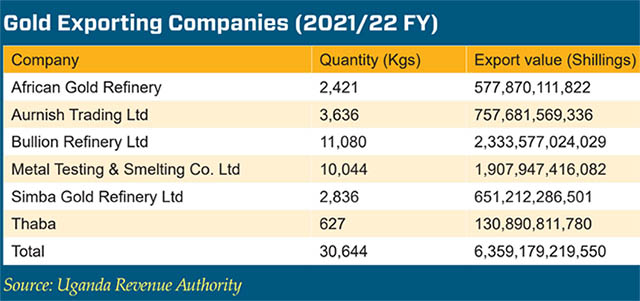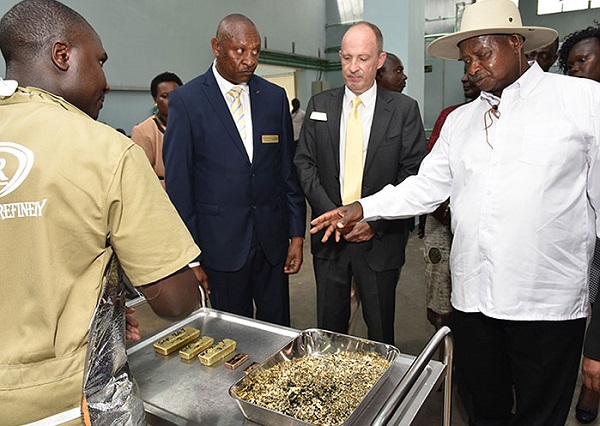
Opaqueness surrounding Uganda’s gold data has not only frustrated UGEITI but also other government agencies like UBOS and URA
NEWS ANALYSIS | RONALD MUSOKE | Where does Uganda source the millions of dollars’ worth of gold it exports annually? This question often dominates discussions involving artisanal miners, gold traders, government officials, and civil society groups. But the answers remain as varied as they are perplexing.
The issue resurfaced on Nov. 28 during the unveiling of Uganda’s third Extractive Industries Transparency Initiative (EITI) report published by the Uganda National EITI Secretariat (UGEITI). The report strives to highlight the country’s efforts to improve transparency and governance in its oil, gas, and mineral sectors.
Uganda joined the EITI four years ago as part of a global initiative to promote accountable management of natural resources in resource-rich nations.
However, just like its two previous studies, the latest report by UGEITI uncovers significant gaps in the country’s gold production and export data. This inconsistency raises fresh concerns about the traceability and accountability of Uganda’s gold trade, despite the commodity being a major contributor to the country’s export earnings.
UGEITI said it identified a number of gaps in the data currently available for the sector including; the amount of gold being produced in Uganda, estimates of the informal mining sector’s contribution to local gold production as well as the amount of gold which could be coming from outside the borders.
For instance, during the period under review (2021/2022), the Uganda Revenue Authority (URA) recorded gold exports from local refineries and exporters valued at Shs 6.3 trillion, compared to imports reported by one refinery of just Shs 1.3bn.
According to the report, African Gold Refinery, one of the biggest gold refineries in the East African region, exported 2,421kg of gold valued at Shs 578 billion. Aurnish Trading Ltd exported 3,636kg worth Shs 758 billion, Bullion Refinery Limited shipped out 11,080kg, totaling Shs 2.3 trillion while Metal Testing and Smelting Co. Ltd exported 10,044kg, valued at Shs 1.9 trillion.
Simba Gold Refinery Ltd exported 2,836kg, worth Shs 651bn while Thaba exported 627kg worth about Shs 130bn.Thaba was also the only company which imported 7,202kg of gold worth about Shs 1.38 billion.
In an attempt to explain these discrepancies, some officials suggest that the reported gold could be entering the country through undocumented means, possibly from neighbouring countries, particularly the Democratic Republic of Congo and South Sudan.

Uganda’s gold boom
Last year, Uganda’s gold exports rose more than 10 times according to Bank of Uganda data published on March 14. The central bank said Uganda exported gold worth US$2.3bn compared with US$ 201 million, a year earlier.
Industry experts, who attempted to explain the sudden surge then, attributed the upshoot in exports to the newest gold miner and processor, Wagagai Mining Ltd, a Chinese-owned firm operating in Busia, eastern Uganda. Other experts said exporters could have taken advantage of a government suspension of tariffs on gold exports issued in 2022.
In 2022, the Observatory of Economic Complexity, an online platform that analyses global trade data, noted how Uganda exported US$ 1.92bn worth of gold, making it the 39th largest exporter of the precious metal in the world. The Observatory said gold was the “foremost exported product” in the country. In the same year, Uganda imported US$ 3.72 million worth of gold becoming the 106th largest importer of gold in the world.
The Observatory listed Uganda’s main destinations of gold exports as; the United Arab Emirates (US$1.19bn), India (US$417 million), Hong Kong (US$ 305 million), United States (US$ 116,000) and South Korea (US$107,000). On the other hand, the Observatory noted that Uganda imported its gold primarily from Tanzania (US$ 3.46 million), the Democratic Republic of Congo (US$ 149,000) and the United Arab Emirates (US$ 109,000).
Opaque sector
Indeed, the opaqueness surrounding Uganda’s gold data has not only frustrated UGEITI but also other government agencies like the Uganda Bureau of Statistics (UBOS).
Speaking during the dissemination workshop of the EITI report, William Anguyo, a Statistician based at UBOS—the government agency responsible for generating all statistics in Uganda—said the agency has continued to face challenges in acquiring robust data on mineral production including gold.
“There are sudden changes in production figures that one cannot explain. Sometimes we collect the data from the mining companies to explain the changes in production figures but the data coming from the Directorate of Geological Survey and Mines (DGSM) is difficult to explain.” “Our request is that DGSM becomes transparent because the data we pick from the mining sector goes into the computation of the country’s GDP,” Anguyo said.
Gloria Mugambe, the head of the Uganda EITI Secretariat noted during the dissemination meeting in Kampala that among the reasons for Uganda’s “moderate score” following its validation by the EITI Board was the glaring discrepancies in Uganda’s gold production and export data.
“The discrepancy between import and export figures of gold affected Uganda’s overall EITI score,” she said, adding that the issue is not only with gold. “It is with other minerals but the issue of gold was highlighted because the difference was quite huge.”

Negative impact on revenue collection
The lack of robust gold data has also meant that the Uganda Revenue Authority cannot tax the sector appropriately- a situation which has meant that the government continues to lose out on the much-needed revenues.
In his December 2022 report to Parliament, the then Auditor General, John Muwanga, blamed the Uganda Revenue Authority for the failure to collect tax on gold worth Shs 340bn from gold exporters, despite the players in the industry earning trillions of shillings from gold transactions. The Auditor General said a total of Shs 340bn in taxes had not been collected from gold exports valued at Shs 6.92 trillion for the year under review.
Last month, Daily Monitor analyzed data from the Uganda Revenue Authority which showed that over 46,000kg of gold worth US$2.98bn (Shs 11.3 trillion) were exported between June 2023 and June 2024.
The report noted that although URA assessed taxes amounting to Shs 34.77bn on these exports, the tax authority collected Shs 3.39bn or 9.74% of the assessed taxes. The payment corresponded to 4,484kg of exported gold worth US$321 million (Shs 1.22 trillion). In contrast, a whopping Shs 31.38bn in taxes remains unpaid, related to 41,779kg of gold worth US$2.66bn (Shs 10.12 trillion).
The government imposes a tax of US$200 (Shs 739,528) on every kilogram of exported gold, as stipulated in the Mining and Mineral (Export of Refined Gold) Regulations. First issued in March 2023, these regulations expired in June 2023 and were subsequently replaced by a new instrument on May 24, 2024. Records from URA indicate that gold exports in 2021/22 weighed 30,189.71kg while in 2022/23, the exports were 40,648.2kg thus totaling 70,837.9kg.
Political interference
Experts say since the sector is quite lucrative, it is not surprising that it suffers a lot from political interference. Even when there have been several bids by Parliament to streamline the sector, little has been realized. In a bid to regulate the industry, Parliament passed the Mining and Minerals Export Levy on Refined Gold Regulations, 2023, last year. The law provided for an export levy of 5% on the value of refined gold for exports as well as a 10% tax on unrefined gold.
But the gold exporters went up in arms accusing the URA of frustrating their business. Ruth Nankabirwa, the Minister of Energy and Mineral Development suspended the levy. The tax rates were later revised to US$200 per kilogram of refined gold and 1% on the value of each kilogram of unrefined gold. The surge in exports resumed leaving URA officials frustrated.
At the beginning of this year, on January 28, the Uganda Revenue Authority (URA) again tried to intervene in the sector, alerting all airlines operating in Uganda not to accept any gold shipments from Uganda if the exporters have no proof of clearance of all outstanding arrears or made arrangements to do so.
“I am writing to inform you that customs management has guided that no gold export will be processed from January 28, 2024, until the exporters have cleared their outstanding tax arrears or made arrangements to do so with Commissioner Customs.
“Accordingly, do not accept any gold shipments in your flight as doing so will constitute conveying unaccustomed goods contrary to Section 199 of the East African Community Customs Management Act (EACCMA), 2004, as amended, ”noted the notice from URA.
In an attempt to explain the reasons behind the discrepancy in gold figures, David Sebagala, the Senior Inspector of Mines noted during the EITI report dissemination meeting that there has been a lack of provisions with the Minerals law for the treatment of data from the country’s standalone gold processing/refining firms.
Sebagala said the biggest source of gold exports are the gold refineries. “In the period under review, the legislation did not stipulate that DGSM regulates standalone gold refining facilities,” he said, “So, when the refineries came into place, URA chose to license them under the manufacture under bond scheme and the URA is responsible for generating the gold export schemes. We are now working hand-in-hand with URA,” he said.
However, Sebagala said following a meeting in May, this year, between the energy and mineral development ministry, URA’s customs department and DGSM, the government entities are working on modalities on how mineral flows should be controlled (both in-coming and out-going mineral flows).
“Based on the agreements and documents we generated in that meeting, we agreed that the URA will not issue or allow exports, even if you paid taxes, if those export consignments are not accompanied by an export permit from the Ministry of Energy and Mineral Development.” It remains to be seen how the latest move will go in helping the sector come up with credible data surrounding Uganda’s lucrative gold sector.
 The Independent Uganda: You get the Truth we Pay the Price
The Independent Uganda: You get the Truth we Pay the Price



